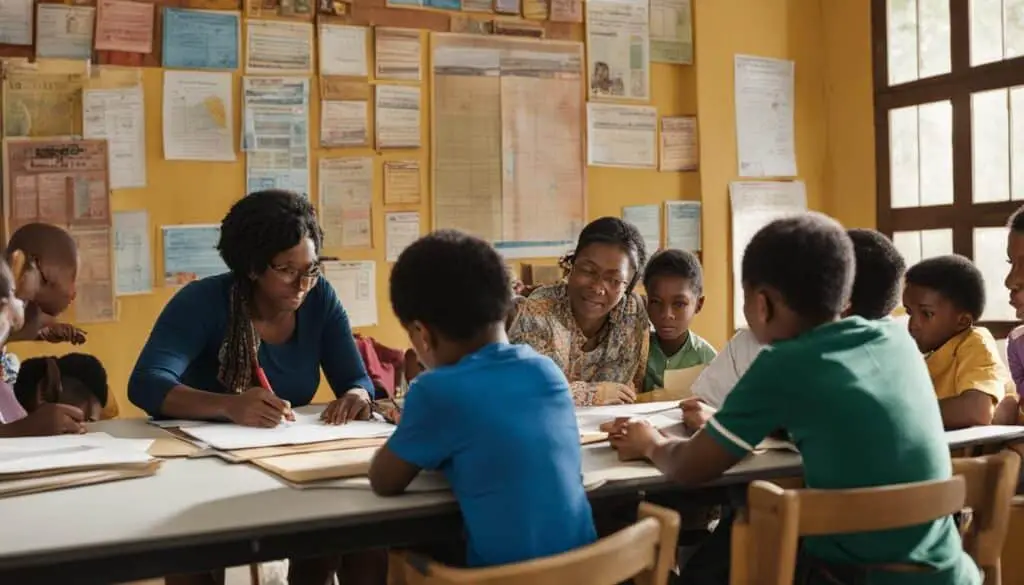
Parenting Children with Learning Disabilities: A Comprehensive Guide
Parenting children with learning disabilities can be a challenging journey. It requires compassion, understanding, and specialized strategies to help them thrive. In this comprehensive guide, I will explore various aspects of parenting children with learning disabilities, including strategies for support, educational resources, and promoting their overall well-being.
Key Takeaways:
- Parenting children with learning disabilities can be a challenging journey that requires specialized strategies and support.
- Understanding the specific challenges your child faces and how it affects their learning and development is crucial.
- Creating a supportive environment at home with routines, realistic expectations, and a safe space is essential.
- Collaborating with educators and professionals is crucial for ensuring your child receives the necessary support in their educational journey.
- Promoting social and emotional well-being is important for children with learning disabilities to build resilience and navigate challenges.
Understanding Learning Disabilities in Children
When it comes to parenting children with learning disabilities, it is crucial to have a comprehensive understanding of the challenges they face. Learning disabilities can manifest in various ways, affecting a child’s ability to read, write, do math, or focus their attention. By gaining a deeper understanding of these disabilities, parents can better advocate for their child’s needs and provide the appropriate support.
One of the key aspects of understanding learning disabilities is recognizing that each child’s experience is unique. Learning disabilities can differ in their severity and the specific areas of learning that are affected. For example, some children may struggle with reading fluency, while others may have difficulty with reading comprehension. By recognizing these individual differences, parents can tailor their support and interventions to meet their child’s specific needs.
It is also important to understand that learning disabilities are not indicative of a lack of intelligence or effort on the part of the child. These disabilities are neurobiological in nature and can impact a child’s ability to process and retain information. By recognizing that learning disabilities are a result of neurological differences, parents can approach their child’s challenges with empathy and support.
By understanding the specific challenges that come with learning disabilities, parents can better advocate for their child within the education system. This may involve working closely with teachers and school administrators to develop individualized education plans (IEPs) that provide the necessary accommodations and support for their child’s learning needs.
Ultimately, understanding learning disabilities is an ongoing process that requires continuous learning and adaptation. By staying informed about current research, resources, and best practices, parents can ensure that they are equipped with the knowledge and tools necessary to support their child’s learning and development.
Recognizing Learning Disabilities
Learning disabilities can present themselves in various ways, and it is essential for parents to recognize the signs and seek appropriate interventions. Here are some common signs of learning disabilities in children:
- Difficulty with reading, such as slow reading, poor comprehension, or struggles with phonics
- Trouble with writing, such as illegible handwriting, difficulty organizing thoughts, or spelling errors
- Challenges with math, including difficulty understanding concepts, trouble with basic calculations, or struggles with problem-solving
- Inattention and difficulty maintaining focus, leading to poor academic performance and challenges with completing tasks
- Slow processing speed, often resulting in difficulty keeping up with classroom instruction or completing assignments within the given time frame
If parents notice these signs or suspect that their child may have a learning disability, it is essential to seek a professional evaluation. A comprehensive assessment by a qualified professional can provide a diagnosis and guide the development of appropriate interventions and support strategies.
Remember, parenting a child with a learning disability requires patience, understanding, and a willingness to adapt. By gaining a deeper understanding of learning disabilities, parents can create an environment that supports their child’s learning and fosters their overall well-being.
Common Learning Disabilities and Their Characteristics
| Learning Disability | Characteristics |
|---|---|
| Dyslexia | Difficulty with reading, such as decoding words, recognizing sight words, and poor reading comprehension. |
| Dysgraphia | Challenges with writing, including illegible handwriting, difficulty organizing thoughts, and struggles with spelling and grammar. |
| Dyscalculia | Trouble with math concepts, such as difficulty understanding numbers, symbols, and mathematical operations. |
| Attention-Deficit/Hyperactivity Disorder (ADHD) | Inattention, impulsivity, and hyperactivity that can impact learning and academic performance. |
| Processing Speed Disorder | Slow processing of information, leading to difficulties in keeping up with classroom instruction or completing tasks within the given time frame. |
Creating a Supportive Environment at Home
Parenting children with learning disabilities can be a rewarding but challenging experience. As a parent, creating a supportive environment at home is crucial for the well-being and success of your child. By establishing routines, setting realistic expectations, and providing a safe and nurturing space, you can help your child feel more confident and capable in navigating their learning challenges.
Establishing Routines: Consistency and structure are essential for children with learning disabilities. By establishing daily routines for tasks such as homework, chores, and leisure activities, you create a sense of predictability and stability. Routines help children feel secure and enable them to better manage their time and tasks.
Setting Realistic Expectations: It’s important to set realistic expectations for your child, taking into account their unique abilities and challenges. Avoid comparing them to their peers or placing undue pressure on academic achievements. Instead, focus on their individual progress and celebrate their accomplishments, no matter how small.
Providing a Safe and Nurturing Space: Creating a physically and emotionally safe environment at home is essential. Ensure that your child has a quiet and comfortable space to study, free from distractions. Encourage open communication, active listening, and empathy to foster a nurturing atmosphere where they feel comfortable expressing their thoughts and emotions.
Supportive Environment Infographic:

“Creating a supportive environment at home is crucial for the well-being and success of children with learning disabilities.”
By creating a structured and supportive environment at home, you are providing your child with a strong foundation. This supportive space empowers them to develop the necessary skills and resilience to thrive academically, socially, and emotionally. Remember, every child is unique, and it’s essential to tailor your approach to their individual needs. With your love, understanding, and support, your child can overcome challenges and reach their full potential.
Collaborating with Educators and Professionals
As parents of children with learning disabilities, collaborating with educators and professionals plays a pivotal role in ensuring that our children receive the necessary support and accommodations to thrive in their educational journey. By actively engaging with teachers, attending Individualized Education Program (IEP) meetings, and seeking guidance from specialists, we can build a comprehensive support system that meets our child’s unique needs.
Communication is Key:
In order to effectively collaborate with educators, open and ongoing communication is essential. Regularly touch base with your child’s teachers to discuss progress, challenges, and any concerns. Actively participate in parent-teacher conferences, where you can gain valuable insights into your child’s academic performance and areas requiring improvement. Share your observations about your child’s learning style and any strategies that have been successful at home, as this information can greatly inform their educational plan.
Attend IEP Meetings:
Individualized Education Program (IEP) meetings are an important platform for collaborating with educators and professionals to develop and update your child’s educational plan. These meetings provide an opportunity to review your child’s goals, progress, and any necessary adjustments to their academic support. Make sure to actively contribute to the discussion by sharing your insights and concerns, ensuring that your child’s individual needs are addressed in the plan.
Seek Guidance from Specialists:
In addition to working closely with educators, consulting professionals experienced in supporting children with learning disabilities can offer valuable guidance. Specialists such as educational psychologists, speech therapists, and occupational therapists can provide targeted interventions and strategies to address specific challenges your child may face. Collaborating with these professionals can empower you with additional tools and resources to support your child’s educational and developmental journey.
Quotes:
“Collaborating with educators and professionals has been instrumental in unlocking my child’s potential and ensuring they receive the right support. It’s a collaborative effort that truly makes a difference.” – Sarah Thompson, Parent
“By actively engaging with my child’s teachers and seeking guidance from professionals, I have been able to advocate effectively and ensure their needs are met in the educational setting.” – John Adams, Parent
Benefits of Collaborating with Educators and Professionals
| Benefits | Explanation |
|---|---|
| Customized Support | Collaboration ensures that support and interventions are tailored to meet your child’s individual needs. |
| Specialized Expertise | Working with professionals provides access to specialized knowledge and strategies to address specific challenges. |
| Enhanced Advocacy | Collaboration empowers parents to advocate effectively for their child’s needs within the educational system. |
| Improved Outcomes | By working together, educators, professionals, and parents can foster an environment that promotes academic and personal growth. |
Collaborating with educators and professionals is a cornerstone of ensuring that children with learning disabilities receive the support they need to thrive academically and personally. By actively engaging with the educational team, attending IEP meetings, and seeking guidance from specialists, parents can create a holistic support system that empowers their child to reach their full potential.

Promoting Social and Emotional Well-being
Promoting social and emotional well-being is an essential aspect of parenting children with learning disabilities. It is important to create a supportive environment that fosters positive relationships and encourages self-advocacy. By providing opportunities for social interactions and emotional expression, parents can help their children navigate the challenges they may face and build resilience.
One effective way to promote social well-being is by encouraging social interactions. By facilitating friendships and social connections, children with learning disabilities can develop a sense of belonging and establish a support network. Encourage your child to participate in extracurricular activities, join clubs, or engage in group projects where they can interact with peers who share similar interests.
Another important aspect of promoting social well-being is teaching self-advocacy skills. Help your child understand their strengths and challenges and encourage them to communicate their needs effectively. By empowering them to express their thoughts and concerns, you are nurturing their self-confidence and promoting their social integration.
“Children with learning disabilities have unique abilities and strengths that should be celebrated. By focusing on their strengths and providing opportunities for success, we can foster their emotional well-being.”
Emotional well-being is equally important. It is crucial for parents to create a safe space where their children feel comfortable expressing their emotions. Validate their feelings and provide support during challenging times. Teaching them healthy coping mechanisms, such as deep breathing exercises or journaling, can also contribute to their emotional resilience.
Here are some strategies for promoting social and emotional well-being:
- Encourage social interactions and friendships
- Teach self-advocacy skills
- Validate and support their emotions
- Teach healthy coping mechanisms
By prioritizing social and emotional well-being, parents can help their children with learning disabilities thrive and live fulfilling lives.
| Benefits of promoting social and emotional well-being | Strategies |
|---|---|
| Enhanced social skills and relationships | Encourage social interactions and friendships |
| Improved self-confidence and self-esteem | Teach self-advocacy skills |
| Greater emotional resilience | Validate and support their emotions, teach healthy coping mechanisms |
Conclusion
Parenting children with learning disabilities is a challenging but rewarding journey. It requires patience, understanding, and a willingness to adapt. With the right support and resources, children with learning disabilities can thrive and reach their full potential.
As a parent, being proactive and educating yourself about your child’s specific needs is crucial. By understanding their challenges and strengths, you can better advocate for their needs and provide the necessary support. Remember, you are not alone on this journey. There are numerous resources and support networks available to help you navigate the challenges and celebrate the successes.
Creating a nurturing environment at home, collaborating with educators and professionals, and promoting social and emotional well-being are key aspects of parenting children with learning disabilities. By establishing routines, setting realistic expectations, and fostering positive relationships, you can create a supportive atmosphere where your child feels confident and capable.
Parenting children with learning disabilities is a journey that may have its ups and downs, but with your love, care, and dedication, your child can overcome obstacles and thrive. By providing them with the right tools and opportunities, you will empower them to reach their full potential and lead a fulfilling life.
FAQ
What are learning disabilities in children?
Learning disabilities in children refer to difficulties in reading, writing, math, or attention that affect their learning and development.
How can parents create a supportive environment at home for children with learning disabilities?
Parents can create a supportive environment at home by establishing routines, setting realistic expectations, and providing a safe and nurturing space.
Why is collaborating with educators and professionals important for children with learning disabilities?
Collaborating with educators and professionals is crucial to ensure that children with learning disabilities receive the necessary support and accommodations in their educational journey.
How can parents promote social and emotional well-being in children with learning disabilities?
Parents can promote social and emotional well-being by fostering positive relationships, encouraging self-advocacy, and providing opportunities for social interactions and emotional expression.
What should parents understand about parenting children with learning disabilities?
Parents should understand that parenting children with learning disabilities requires patience, understanding, and a willingness to adapt. It is a journey that may have ups and downs, but with the right support and resources, children with learning disabilities can thrive.
Are there resources and support networks available for parents of children with learning disabilities?
Yes, there are numerous resources and support networks available to help parents navigate the challenges and celebrate the successes of parenting children with learning disabilities.